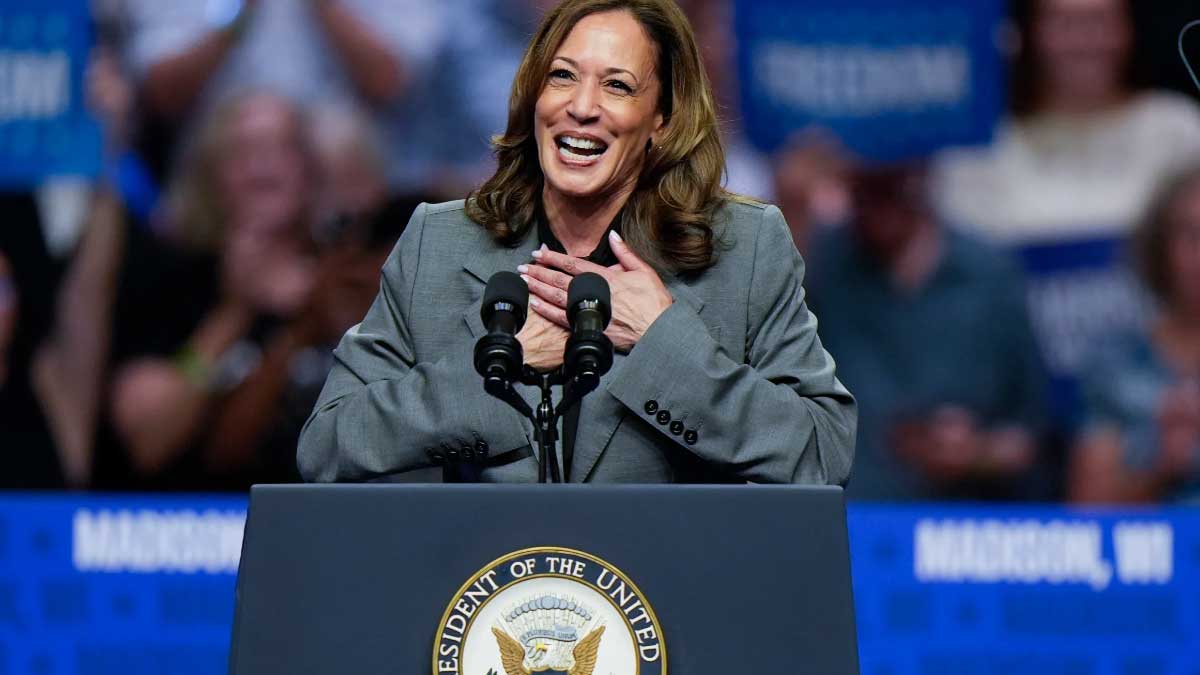- Home
- Billionaires
- Investing Newsletters
- 193CC 1000
- Article Layout 2
- Article Layout 3
- Article Layout 4
- Article Layout 5
- Article Layout 6
- Article Layout 7
- Article Layout 8
- Article Layout 9
- Article Layout 10
- Article Layout 11
- Article Layout 12
- Article Layout 13
- Article Layout 14
- Article Sidebar
- Post Format
- pages
- Archive Layouts
- Post Gallery
- Post Video Background
- Post Review
- Sponsored Post
- Leadership
- Business
- Money
- Small Business
- Innovation
- Shop
Recent Posts
Harris Proposes Economic Reforms for the Middle Class

Vice President Kamala Harris is poised to expand on her economic platform during a speech scheduled for Wednesday in Pennsylvania. This comes after she has already advocated for an “opportunity economy” that prioritizes the middle class. Her plans include initiatives aimed at reducing grocery and prescription drug prices, as well as addressing the ongoing housing crisis.
To tackle grocery prices, Harris aims to work within her first 100 days to support Congress in passing a national ban on “price gouging” for food. She intends to empower the Federal Trade Commission and prosecutors to take action against companies found to be engaging in price gouging. Furthermore, Harris plans to support small businesses within the food industry, scrutinize mergers among major grocery companies, and launch aggressive investigations into price-fixing practices in meat supply chains. However, some economists have raised doubts about whether price gouging has exacerbated inflation or if stricter regulations would be effective.
Regarding housing costs, Harris has proposed offering $25,000 in down payment assistance to first-time homebuyers and aims to create three million new housing units over the next four years. She suggests implementing a tax credit for developers who build starter homes and investing $40 billion into an “innovation fund” to address housing shortages. Additionally, she seeks to expand tax credits for developers of affordable rental housing and urges Congress to legislate against predatory investors who purchase rental homes and collude to drive up rental prices.
Harris has also put forth a proposal for a $6,000 tax credit for families with newborns in their first year of life and aims to restore a pandemic-era child tax credit of $3,600 per child for middle and lower-income families. Furthermore, she seeks to broaden the Earned Income Tax Credit for lower-income workers, potentially reducing taxes by up to $1,250. She has reiterated her commitment to maintaining President Joe Biden’s pledge not to raise taxes on American households earning $400,000 or less, while also supporting higher taxes for wealthy individuals and corporations.
In a move to aid hospitality and service workers, Harris has endorsed eliminating taxes on tips, reflecting a proposal previously made by former President Donald Trump. However, a campaign official clarified that tips would still be subject to payroll taxes and would include limitations to prevent misuse by high earners. On prescription drug pricing, Harris has proposed capping insulin costs at $35 and limiting out-of-pocket expenses for prescription drugs to $2,000 per year. She plans to expedite Medicare negotiations for drug pricing and address anti-competitive practices in the pharmaceutical industry that contribute to inflated costs.
The Harris campaign has also announced intentions to collaborate with states to alleviate Americans’ medical debt and to expand subsidies for Affordable Care Act plans, potentially saving health insurance customers an average of $700 on premiums. Although she has not released a specific paid leave proposal, Harris has previously co-sponsored legislation advocating for 12 weeks of paid leave, indicating her support for such measures. In a recent speech in Las Vegas, she called for an increase in the minimum wage, though her campaign has yet to specify the proposed amount.
Harris has made a commitment to uphold the independence of the Federal Reserve, countering Trump’s assertion that the president should have influence over its decisions. She has emphasized that the Federal Reserve operates independently and that she would not interfere with its decision-making as president. During an August interview, Harris stated that her immediate priority upon taking office would be to implement her economic agenda, focusing on supporting and strengthening the middle class. She believes that while the Biden administration has achieved significant progress, there is still much more to be accomplished.
Her upcoming speech at the Economic Club of Pittsburgh is anticipated to include detailed comments on her economic policies. A Harris aide has indicated that the speech will portray her as pragmatic and as someone who understands the limits of government intervention while harnessing the power of innovation. The speech is expected to introduce new proposals focused on manufacturing, reducing costs, and investing in American innovation and entrepreneurship, positioning her as a candidate for future industries.
Comparing her economic policies to those of President Biden, Harris’ agenda largely aligns with his platform but highlights specific causes that resonate more with her, such as the child tax credit. A Harris aide noted, “Same values, different vision,” indicating that while she remains close to Biden on key issues, she will emphasize the areas most important to her. Moreover, her campaign suggests a more aggressive approach to policy than Biden’s, especially as recent polls indicate that voters are critical of the president’s economic handling. Harris’ proposal to empower the FTC to address price gouging extends beyond Biden’s existing stance, and her commitment to invest significantly in addressing the housing crisis demonstrates her determination to take more pronounced action.
However, the depth of her economic agenda has been called into question, as reports suggest that the Harris campaign has intentionally adopted a strategy of “strategic vagueness” around her proposals. This approach is believed to allow her to present a broader appeal while mitigating potential attacks from opponents and attracting support from business groups.
Harris’ economic policies also contrast with those of Trump, who has focused on raising tariffs on imports, a strategy Harris opposes. Trump has advocated for tax cuts and deregulation to alleviate inflation, as well as increasing oil production to reduce energy prices. Both candidates support eliminating taxes on tips for service workers, but Trump has proposed ending taxes on Social Security benefits, a stance Harris has yet to address. Critics argue that such proposals could threaten the financial stability of Social Security and Medicare, with experts projecting significant revenue losses if implemented. Amidst Harris’ efforts to outline her economic plans, the Trump campaign has criticized her proposals, suggesting that her policies are disconnected from the realities facing Americans.
Polls indicate that 41% of voters trust Harris more with economic matters, slightly trailing behind Trump at 43%. While Trump maintains a narrow lead, recent trends show that Harris is gaining ground in public perception regarding economic management, moving from a strong disadvantage to a more competitive stance. In the wake of Biden’s unexpected withdrawal from the presidential race, Harris quickly garnered support from Democratic voters, prioritizing the release of her economic agenda as a crucial aspect of her campaign. Her focus on economic issues resonates with voters, particularly as polling shows it to be the primary concern in the upcoming election cycle, especially in light of Biden’s lower approval ratings regarding economic performance.
Recent Posts
Categories
- 193 Countries Consortium Partner1
- 193cc Digital Assets2
- 5G1
- Aerospace & Defense48
- AI37
- Arts3
- Banking & Insurance11
- Big Data3
- Billionaires1,506
- Boats & Planes1
- Business332
- Careers13
- Cars & Bikes79
- CEO Network1
- CFO Network17
- CHRO Network1
- CIO Network1
- Cloud10
- CMO Network18
- Commercial Real Estate7
- Consultant1
- Consumer Tech194
- CxO1
- Cybersecurity73
- Dining1
- Diversity, Equity & Inclusion4
- Education7
- Energy8
- Enterprise Tech29
- Events11
- Fintech1
- Food & Drink2
- Franchises1
- Freelance1
- Future Of Work2
- Games149
- GIG1
- Healthcare79
- Hollywood & Entertainment203
- Houses1
- India’s 1000 Richest1
- Innovation46
- Investing2
- Investing Newsletters4
- Leadership65
- Lifestyle11
- Manufacturing1
- Markets20
- Media327
- Mobile phone1
- Money13
- Personal Finance2
- Policy569
- Real Estate1
- Research6
- Retail1
- Retirement1
- Small Business1
- SportsMoney42
- Style & Beauty1
- Success Income1
- Taxes2
- Travel10
- Uncategorized15
- Vices1
- Watches & Jewelry2
- world's billionaires1,475
- Worlds Richest Self-Made Women2
Related Articles
South Korea Plane Crash: A Tragic Loss and Global Mourning
The tragic plane crash at South Korea’s Muan International Airport on Sunday...
By 193cc Agency CouncilDecember 30, 2024H-1B Visa Debate Splits Trump Allies and Silicon Valley
The debate over H-1B visas has once again become a contentious issue,...
By 193cc Agency CouncilDecember 28, 2024Trump Moves $4B Stake in Truth Social Parent, Stock Drops 6%
Donald Trump recently transferred his 57% stake in Trump Media & Technology...
By 193cc Agency CouncilDecember 20, 2024House Rejects Trump-Backed Funding Bill, Shutdown Looms
The U.S. House of Representatives rejected a new government funding bill on...
By 193cc Agency CouncilDecember 20, 2024















Leave a comment